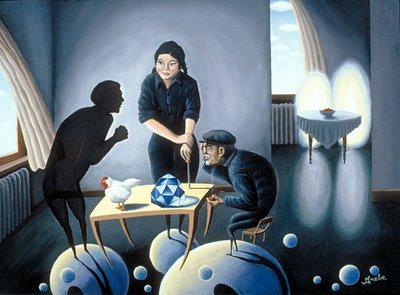Analog Aesthetics
superior.acoustics
Tuesday, November 15, 2005
Tuesday Potluck

Lessons learned today:
Get up when your alarm goes off.
Don't leave the house without your wallet.
Don't walk in the rain for an hour.
Don't place your electronic gadgets in any compartments exposed to water.
My books are soaked, my notes bleeding into one another, and my cell phone has stopped working. I would even guess permanently. For about 5 minutes, I was really frantic - how will people reach me? How can my German friends send me text messages for late-nite beer rendevous? Then I remembered. I hate cell phones and have only had this one for 2 months. And I'm already frantic when it breaks! Goodness. This is a sign. Sorry everyone, I know it'll mean you won't always reach me, and believe me when I say I always want to talk to you, but you'll just have to call my house phone. I may or may not be getting a new cell phone.Whew! Battled that addiction.
NPR's All Songs Considered is an online opportunity to hear lesser-known artists broadcast on another show, All Things Considered. This is as good as it gets for using internet to augment radio broadcasts. Who says the two can't reach a compromise? One more reason I'll be crossing my fingers for an internship with them next year. And because I DO want you to check them out, here's a live CocoRosie set on All Songs Considered. Listen and buy their records!
Reading Charles Olsen for class: poetry should be energy of the heart expressed through the breath or the LINE; energy of the mind expressed through the ear or the SYLLABLE. Interestingly, he argues against "closed" verse for its restriction in form (like Shakespeare's sonnets), but not against using a typewriter, claiming it gives the poet at last the bar and staff of the musician. He insists poets pay attention to a poem's place in both space - which he calls a field - and time so that form reflects content - but to use a typewriter, one has a sort of code for spaces, which in turn translate to pauses, and line breaks, so that the reader "knows" how to read the poem both silently and aloud. He's taken the limitation of form of sonnets and freed poetry from it, but in doing so opted for another limitation, which he cleverly disguises as an "objective system" for pause. I found this an interesting analogy for what I see occuring in the Digital Era - we are freed from wired connections, slow speeds, pen and paper, physical reality, but in doing so we're only shifting the restrictions and limitations to other areas: now we need the equipment, now we need more power and money, now we need clear skies and big landfills and everything fully functioning. If one area of the map goes haywire, you're likely to lose the entire system. Are we more free than before? Or is the illusion of freedom so great we accept a bit of "inconvenience," a term now used in place of "restriction"? Or is it all about the greater convenience, the greater freedom?
I'm all for the utopia of pure freedom, but I think it's foolish to place your faith in technology - a complex network of systems based on rigid rules, logical connections, hierarchy and power, indescribable wealth - to set us free. It's a bit like taking free creative energy and imposing a system of rules so the human heart can decode it. As if we're incapable otherwise...
The tape's still hissing...
-
Winter is Upon Us
Eat, Sleep, Work, Consume, Die
Slumbering Saturdays
Waging War: Digital vs. Analog
speed. go go go, can't slow down, gotta live and w...
Unidad
And so shines the sun...
Ama Update:
ignore
Tape Backups
-
February 2005
November 2005
December 2005
January 2006
March 2006
April 2006
May 2006
June 2006
July 2006
February 2007
March 2007
My blogosphere:
-
WSBF.net
Music Is My Weapon!
The Taranis Posts
Dr. Frank's What's-it
Matt-ism
Sooooz
Thinkblog.org
Miss Kimmel
Adventures With PiRho! - Webcomic.